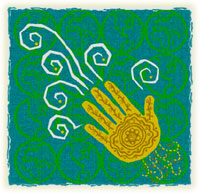 |
|
|
 Mexican Women's Movement Makes the Internet Work for Many Women Mexican Women's Movement Makes the Internet Work for Many WomenBy Erika Smith erika@laneta.apc.org "If I'd known I was going to live this nightmare, I would have let him rape me." Claudia Rodr’guez spent over a year in prison for the homicide of her would-be rapist--awaiting trial and the possibility of 15 years in prison for her act of self-defense. Women's organizations and activists in Mexico mobilized support for her case, declaring her innocence and recognizing the horrible legal precedent a guilty verdict would represent for all women and their possibility to defend themselves from assailants: "As long as Claudia is a prisoner, we are all prisoners." The women's e-mail activist network ModemMujer sent out Claudia's words and situation over the Internet to hundreds of women and women's organizations in Mexico, Latin America, and North America, with calls for letters to the president, the secretary of state, and the Department of Justice. Mobilization by women's organizations in Mexico City resulted in women's flooding the hearing process and public protests. Letters were sent from all over Mexico, Cuba, Argentina, Colombia, Bolivia, Canada, and the United States. Claudia was freed, although the verdict review stated that she had used "excessive force" in her self-defense, and the judge could have sentenced her to an additional five years in jail. The Internet did not free Claudia; her lawyers, community support, and the actions of the women's movement in Mexico and internationally did. The Internet is not a panacea for women's networking, information, and communication needs, but at least in Mexico, the Internet now plays a key role in women's strategizing. Most of the women's organizations in Mexico got their introduction to the Internet via La Neta, the sister node of the Association for Progressive Communication (APC) in Mexico. LaNeta, which is Mexican slang for truth, provides Internet service for Mexican civil society: nongovernmental organizations (NGOs) and activists working in the areas of human rights, environment, fair trade, sustainable development, and women's issues. LaNeta forms part of APC's international Women's Networking Support Program and has promoted use of the Internet for the women's movement in Mexico since LaNeta's beginning in 1993. The APC Women's Program recognizes the gender gap in the use of and access to information and communication technologies worldwide and has lobbied for women's participation in policy decision making in this area. The Women's Program provides women with examples of women techies, and it de-mystifies--via hands-on training using examples of women's networking and nontechnical language--what is otherwise frequently considered a male technology. The idea is not to stun trainees with how much you know about the Internet, but for them to stun you with their plans for it. The APC Women's Program also recognizes that Internet use and skill vary greatly in different countries depending on a country's infrastructure and telecommunication costs. For example, in Latin America, personal Internet use--although on the rise in Mexico--is far less common than organizational use, because only institutions have sufficient capital to afford a telephone line and computer. Surfing also may be limited depending on ISP capabilities and charges as well as local and long-distance telephone costs. The Women's Program, therefore, is dedicated to making sure that women's information and networking flow easily via the lowest common technical denominator--e-mail--so as not to exclude anyone. The program recognizes that despite our splashy world of Java and live sound on the Web, most women's networking on the Internet still gets done with the basic text tools of e-mail, lists, and newsgroups. ModemMujer in Mexico is an excellent example of just that. ModemMujer made its debut with the United Nations' Fourth World Conference on Women in China in 1995. It set up an e-mail correspondent network throughout Mexico to provide women with full Spanish-language coverage of the women's conference. Three participants in Beijing at the APC Communication Center sent daily reports and commentaries on the NGO and official meetings to ModemMujer headquarters in Mexico City, which in turn sent daily bulletins to correspondents in the United States, who then plugged into fax trees, local newspapers, radio, and community groups. The information chain also worked in reverse, with women in China learning of activities and protests and answering specific questions coming in from Mexico. Using only an e-mail list and APC conferences, ModemMujer maintains a personalized relationship with approximately 400 women's organizations, activists, and academics in Latin America, keeping women up-to-date on the Mexican women's movement and its counterparts in the South. Despite the geographic distance separating women and the frequently impersonal nature of Internet exchange, ModemMujer is intent on creating a safe, intimate, and affectionate personal space for women to explore what the Internet has to offer them. Rather than flooding low-resource organizations with an overwhelming quantity of content, ModemMujer offers a list of events, announcements, documents, and analyses from the NGO and academic women's communities. Organizations can request that documents be sent directly to them via e-mail or consult the modemmujer.mex APC conference. ModemMujer's idea is to make information sharing easy and low cost and to encourage women's use of information and communication technology tools, offering women step-by-step instructions on how to use newsgroups or to surf or simply on how to receive an attached file. On May 28, 1996--International Day of Action for Women's Health--the Mexico City Women's Health Network held a public tribunal in defense of women's reproductive health. For the first time in Mexican history, individual women collectively filed suit against the Mexican state's health care apparatus. Charges of involuntary sterilization and grevious medical malpractice resulting in child or maternal death were heard by a jury of experts in human rights and reproductive health, by a packed auditorium, and in APC conferences across Latin America. ModemMujer began the search for claimants and publicity of the event in local LaNeta conferences and, in April, via a simple tribunal Web site. As the individual cases and determinations were heard, ModemMujer posted analysis and results in APC conferences and to a mailing list of women activists in non-APC nodes. ModemMujer received responses from outlying regions in Mexico and Latin America reporting how the tribunal initiative was repackaged for other media as well as plans to reproduce this creative and informative style of protest in their countries. In the aftermath of Beijing, this is just one example of how the women's movement has mobilized to ensure that the Mexican government lives up to all its signed commitments at the women's conference. Women's organizations across the country are taking a specialized weeklong course that ModemMujer and other women's activists helped develop on how to do lobby and advocacy work to exert pressure on the Mexican government and the new National Women's Program. Communication and information networking and strategizing via the Internet are key focuses of the workshop, as the Mexican women's movement begins to recognize the power of the Internet and the need for women to participate in shaping it. Information provided by the ModemMujer Team of Beatriz Cavazos, Milisa Villaescusa, Zaida Rodr’guez; the
APC Women's Networking Support Program; and LaNeta and APC . |

